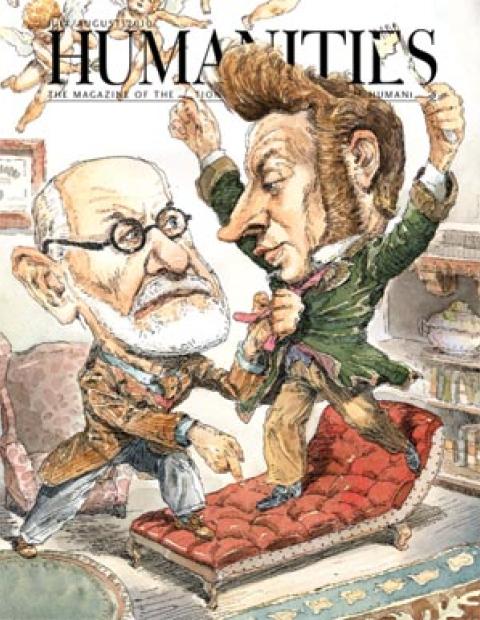All hail the Queen! Duane W. Roller, professor emeritus of Greek and Latin at Ohio State University, has crafted a new account of the life of Cleopatra VII, queen of Egypt. The first account to be based solely on primary sources from the era, Cleopatra: A Biography(Oxford University Press, 2010) moves beyond two thousand years of romance and popular portrayals to discover a formidable ruler. Roller is the author of eight books, including The Building Program of Herod the Great (1998) for which he also received NEH support.
I was surprised to learn that Cleopatra was a scholar. What did she write?
She is known for at least two works, Kosmetikon—which does not mean “Cosmetics,” although some have thought that would be a suitable title for her; the word has a more medical usage about care of the body, and a treatise on weights and measures necessary for medicine, trade, and economics.
She was also multilingual. What languages did she know?
Greek was her native language; she knew Egyptian; and there is a passage by Plutarch that says she knew six other languages (all local languages within or near her kingdom). She probably knew Latin. She was famous for conducting diplomatic business in the language of the person she was speaking to.
What role did being a mother play in Cleopatra’s life?
Probably a major role. She had four children over twelve years. Of course, she would have had a cadre of servants to take care of them, but the most important fact is that her kingdom would survive only through her children, so proper rearing of them was essential. She not only had to choose a partner carefully, but also devote a good many months to being pregnant.
Cleopatra is notorious for her liaisons with two leading Roman statesmen. How would you describe her relationship with Julius Caesar?
She was young—twenty-one—and impressed by having the most powerful Roman as her guest in her palace. Obviously what brought them together was a political need, but the hormones eventually took over, and you can easily see their relationship slipping from political to personal. She had no children and needed an heir, and Caesar had no male children and was himself thinking in monarchical terms that might require an heir. The product, Kaisarion, remained Cleopatra’s principal heir for the rest of her life.
Her relationship with Marc Antony?
In much the same way. After the death of Caesar, Antony became the most powerful Roman, and Cleopatra was still vulnerable both politically and in terms of having only a single heir. They met on political terms: Antony was on an extended stay in the eastern Mediterranean to clean up the mess left by Brutus and Cassius, the assassins of Caesar. The relationship survived for eleven years. In the long run, Antony’s involvement with her contributed to his downfall. He was married to a respectable Roman woman, and it was easy to make political hay in Rome about his being in bed (figuratively and literally) with a foreign queen.
Cleopatra is often portrayed as a femme fatale. Was she?
Two relationships in eighteen years? Hardly. She obviously was a woman of great presence and ability, but her abilities in the bedroom are not what made her unique.
What contemporary writers were kind to her? Mean to her?
Much of the contemporary literary tradition is hostile. The politically correct view was that she was a threat to Rome who had to be eliminated, which led to her demonization. Yet glimpses of admiration occasionally slip through: Horace tells us that she committed suicide because she would not be humbled by being “led in a triumph” in Rome, and Plutarch, writing over a hundred years after her death, speaks of her powerful charm and presence.
Shakespeare’s death scene between Cleopatra and Antony is legendary. Is there a kernel of truth in it?
More than a kernel. It is what the sources say, primarily Plutarch, which is what Shakespeare used. Some of Shakespeare’s dialog is a literal translation of Plutarch, although he read it in English, not Greek. But the famous asp story is improbable logistically and medically, and was likely put forth by the queen herself in her suicide note as a dramatic way to go, but she took poison. Almost everything else Shakespeare has is probably pretty close to the way it happened.
It’s hard to ignore cultural depictions of Cleopatra. Favorite painting of her?
There is so much! I love the Gérôme that shows her appearing before Caesar, and the Rixens showing her death is beautiful. As an opera fanatic, I am drawn to the operatic representations (there are over a dozen), especially Berlioz’s dramatic monologue “La mort de Cléopâtre.”
Favorite film portrayal?
The Claudette Colbert one from the 1930s has some wonderful staging for that time, especially the approach to Tarsos. The Taylor-Burton one, despite many flaws, has some excellent moments. I am hoping that the time is right for a serious portrayal of the queen in cinema, one that shows her as an empowered, educated woman of great talent, like Emily Blunt’s recent portrayal of the young Victoria.
Favorite literary depiction?
There are wonderful nuggets in Plutarch’s Life of Antony: her sailing up the Kydnos River to Tarsos, where you can actually hear and smell everything, and her death scene, which is hard to read without bringing tears to one’s eyes.

